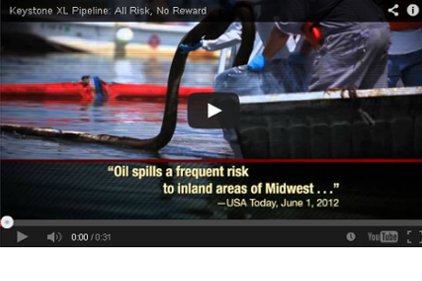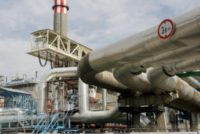“Are you willing to risk Nebraska’s future for foreign profit?” asks one of the state’s farmers, in a national TV ad launched this week by a coalition of groups opposed to the Keystone XL pipeline.
The “All Risk, No Reward” coalition, which includes the League of Conservation Voters (LCV), Nebraska Farmers Union, Bold Nebraska and Oil Change International, said its message is that oil spills occur. “It’s not if, it’s when,” states one of the ads. One of the oil spills featured in the ads is the recent massive leak from an Exxon pipeline in Arkansas which has spilled thousands of barrels of toxic tar sands oil.
Taking aim at claims that the pipeline would benefit U.S. citizens, Nebraska farmer Randy Thompson notes in one ad that the pipeline (made from steel from India) would carry Canadian tar sands to a point where it would be shipped to a refinery owned by Saudia Arabia and sold on the world market. Thompson describes the Canadian tar sands as a “toxic cocktail” and “the dirtiest fossil fuel.”
Not prepared for the consequences
“There is no reward of energy independence with this pipeline. Only risks to our land and water. The jobs will soon disappear, the energy independence will be on a ship to some unknown destination, but the scar on America’s landscape will be with us forever,” said Thompson, who is chair of All Risk No Reward coalition.
“Neither Nebraska landowners such as myself, nor American citizens across the country are prepared for these consequences. We rely on fresh water for drinking and for agriculture — and a spill in the Ogallala Aquifer would make both of these impossible. We’re talking about public health, environmental risks, lost agricultural land and enormous economic costs.”
“These are huge risks, and the benefits don’t come close to balancing them out. Americans are taking the risks while the oil industry and Canada are reaping the benefits.”
Pipeline safety standards
However, a spokesman for a conservative political advocacy group said the pipeline would pose a minimal risk to the environment.
Writing on the National Energy Journal Energy Experts blog, James Valvo of Americans for Prosperity said TransCanada, the company behind Keystone XL, is proposing state-of-the-art technology for the pipeline that includes high strength steel, the latest in corrosion-resistant coatings, and 16,000 sensors, connected by satellite, to measure pressure all along the pipeline.
“A three-year study conducted by the State Department found that Keystone met all of the 57 pipeline safety standards set by the Pipeline and Hazardous Materials Safety Administration,” wrote Valvo.
However, on the same blog, Daniel J. Weiss of the Center for American Progress Action Fund called the pipeline “inevitably leaky,” and pointed out that the State Department’s draft Supplemental Environmental Impact Statement (SEIS) acknowledges that the project is projected to generate 35 permanent jobs, which Weiss says is “fewer positions than on a National Football League roster.”
The SEIS says more than 3,900 temporary jobs will be created over the one to two-year construction period of the pipeline.





